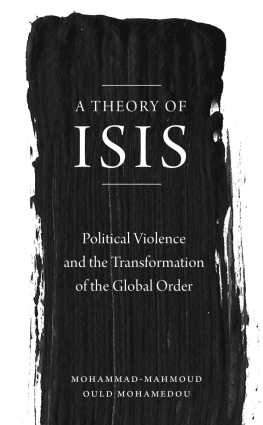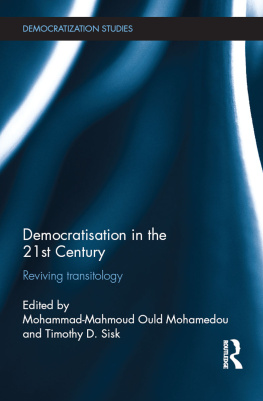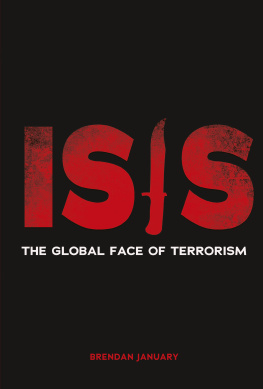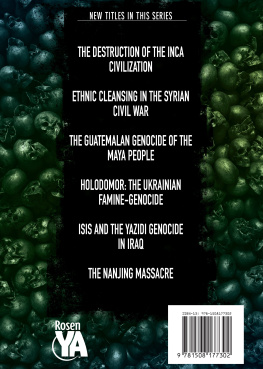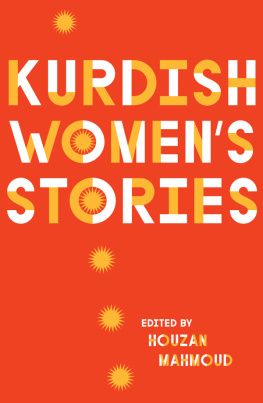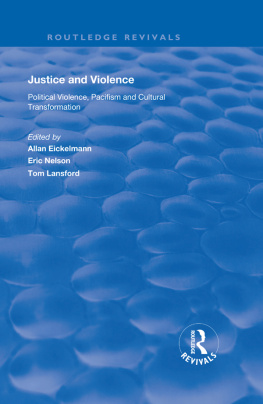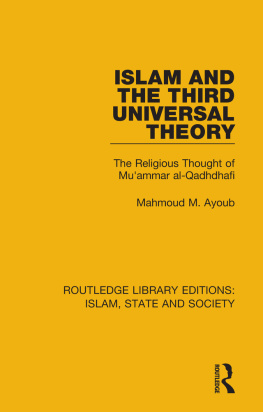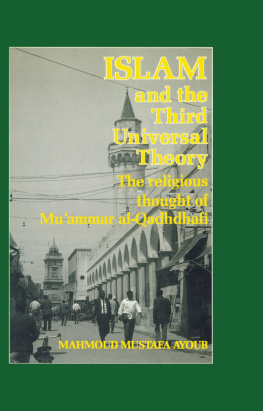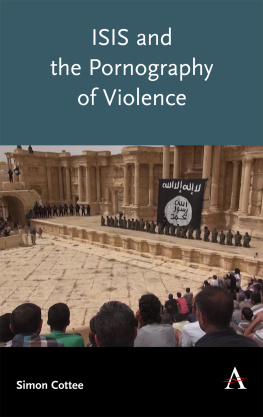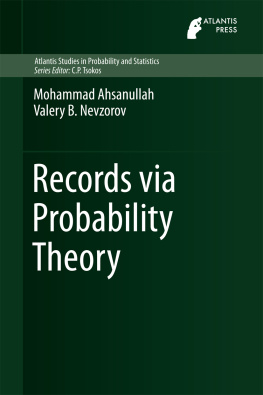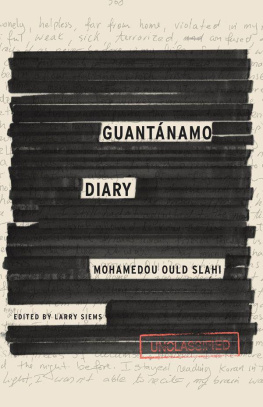Mohammad-Mahmoud Ould Mohamedou - A Theory of ISIS Political Violence and the Transformation of the Global Order
Here you can read online Mohammad-Mahmoud Ould Mohamedou - A Theory of ISIS Political Violence and the Transformation of the Global Order full text of the book (entire story) in english for free. Download pdf and epub, get meaning, cover and reviews about this ebook. publisher: Book Network Intl Limited trading as NBN International (NBNi), genre: Politics. Description of the work, (preface) as well as reviews are available. Best literature library LitArk.com created for fans of good reading and offers a wide selection of genres:
Romance novel
Science fiction
Adventure
Detective
Science
History
Home and family
Prose
Art
Politics
Computer
Non-fiction
Religion
Business
Children
Humor
Choose a favorite category and find really read worthwhile books. Enjoy immersion in the world of imagination, feel the emotions of the characters or learn something new for yourself, make an fascinating discovery.
- Book:A Theory of ISIS Political Violence and the Transformation of the Global Order
- Author:
- Publisher:Book Network Intl Limited trading as NBN International (NBNi)
- Genre:
- Rating:4 / 5
- Favourites:Add to favourites
- Your mark:
- 80
- 1
- 2
- 3
- 4
- 5
A Theory of ISIS Political Violence and the Transformation of the Global Order: summary, description and annotation
We offer to read an annotation, description, summary or preface (depends on what the author of the book "A Theory of ISIS Political Violence and the Transformation of the Global Order" wrote himself). If you haven't found the necessary information about the book — write in the comments, we will try to find it.
Mohammad-Mahmoud Ould Mohamedou: author's other books
Who wrote A Theory of ISIS Political Violence and the Transformation of the Global Order? Find out the surname, the name of the author of the book and a list of all author's works by series.
A Theory of ISIS Political Violence and the Transformation of the Global Order — read online for free the complete book (whole text) full work
Below is the text of the book, divided by pages. System saving the place of the last page read, allows you to conveniently read the book "A Theory of ISIS Political Violence and the Transformation of the Global Order" online for free, without having to search again every time where you left off. Put a bookmark, and you can go to the page where you finished reading at any time.
Font size:
Interval:
Bookmark:
A Theory of ISIS
Political Violence and the
Transformation of the Global Order
Mohammad-Mahmoud Ould Mohamedou

First published 2018 by Pluto Press
345 Archway Road, London N6 5AA
www.plutobooks.com
Copyright Mohammad-Mahmoud Ould Mohamedou 2018
The right of Mohammad-Mahmoud Ould Mohamedou to be identified as the author of this work has been asserted by him in accordance with the Copyright, Designs and Patents Act 1988.
British Library Cataloguing in Publication Data
A catalogue record for this book is available from the British Library
ISBN 978 0 7453 9911 9 Hardback
ISBN 978 0 7453 9909 6 Paperback
ISBN 978 1 7868 0169 2 PDF eBook
ISBN 978 1 7868 0171 5 Kindle eBook
ISBN 978 1 7868 0170 8 EPUB eBook
This book is printed on paper suitable for recycling and made from fully managed and sustained forest sources. Logging, pulping and manufacturing processes are expected to conform to the environmental standards of the country of origin.
Typeset by Stanford DTP Services, Northampton, England
Simultaneously printed in the United Kingdom and United States of America
9/11 | Al Qaedas attacks on the United States, 11 September 2001 |
AQAP | Al Qaeda in the Arabian Peninsula |
AQI | Al Qaeda in Iraq |
AQIM | Al Qaeda in the Islamic Maghreb |
CIA | Central Intelligence Agency |
FBI | Federal Bureau of Investigation |
GWOT | Global War on Terror |
ICRC | International Committee of the Red Cross |
IS | Islamic State |
ISI | Islamic State in Iraq |
ISIL | Islamic State in Iraq and the Levant |
ISIS | Islamic State in Iraq and Syria |
PFLP | Popular Front for the Liberation of Palestine |
UN | United Nations |
UNSC | United Nations Security Council |
This work closes a series of three books on the transformation of political violence in the late twentieth and early twenty-first century, which I embarked on in September 2001. This transnational trilogy has been concerned with the nature and meaning of the groups Al Qaeda and the Islamic State, and the wider contemporary radical Islamist movement they belong to. The first volume, Contre-Croisade: Le 11 Septembre et le Retournement du Monde (the original edition is subtitled Origines et Consquences du 11 Septembre) was written in French (an Arabic version was released in 2010 but it remains untranslated in English) and published in 2004 as I was in the process of moving from Geneva to Boston in the aftermath of the 11 September 2001 attacks (having previously lived for ten years in New York). That work sought to document in as much details as possible the 9/11 attacks and inquire as to their significance in the longer-term history of relations between the Islamic and Western worlds. The second volume sought to expand the investigation from the attacks to the group behind them, widening both the scope and lens of the issues at hand. Researched during a second stay at Harvard University (the first one was in 19967 at the Centre for Middle Eastern Studies) at the Programme on Humanitarian Policy and Conflict Research, of which I was the associate director in 20048, and where I led an international research project on Transnational and Non-State Armed Groups (TAGs), Understanding Al Qaeda: The Transformation of War came out in 2006 (an expanded second edition was released in 2011 and a coda was added in 2013 as a chapter in the book An International History of Terrorism co-edited by Jussi Hanhimaki and Bernhard Blumenau). Understanding Al Qaeda positioned itself against the overemphasis on Al Qaedas religiosity, proposing an alternative reading anchored in three concepts it sought to introduce, namely Al Qaedas militarisation of Islamism, transnationalisation of terrorism and democratisation of responsibility (concepts discussed afresh in war. Overall, the book was an argument about the transformative, not merely innovative, nature of Al Qaedas materialisation and Osama Bin Ladens project.
The present volume began in August 2014 with a policy paper ISIS and the Deceptive Rebooting of Al Qaeda, researched and written at the Geneva Centre for Security Policy, of which I was the deputy director and academic dean from 2014 to 2017 and an invitation by the students of the Middle East Initiative at the Graduate Institute of International and Development Studies in Geneva, Azra Avdagic and Olivia Mathys. The lecture I delivered before the students in September 2014, Understanding ISIS: The Islamic State, Al Qaeda and Post-Modern Globalised Violence, is the basis of this book. Earlier versions of some of the arguments were published in various forms in The Muslim World, Project Syndicate, Open Democracy, The Conversation, Les Clefs du Moyen-Orient, Le Temps and Al Monitor. The ideas contained here were also aired in a number of venues over the years since the 2014 policy paper and lecture, at conferences and colloquia where I benefited greatly from the thoughtful comments and searching questions from audiences at the Fletcher School in Boston, the University of Exeter, Sciences Po Paris, Sciences Po Grenoble, the University of Saint-Joseph in Beirut, the University of St Andrews, the City University of New York, the London School of Economics and Political Science, the Overseas Development Institute in London, the Institute for Human Sciences in Vienna, the Africa Studies Centre in Leiden, the New School in New York and the Rockefeller Centre in Bellagio, the University of Milan, the University of Geneva, the George C. Marshall Centre for Security Studies, the Egmont Institute in Brussels and the United Nations University in Tokyo. I warmly thank my hosts at these institutions, respectively, Nadim Shehadi, Klejda Mulaj, Bertrand Badie, Jihane Melhouf, Karim Bitar, Bernhard Blumenau, Thomas Weiss, Sara Pantuliano, Shalini Randeria, the late Stephen Ellis and Benjamin Soares, Erin McCandless, Mariele Merlati, Matthias Schulz and Ozcan Yilmaz, Joerg Kuntze, Sebastian Einsiedel, Marta Cali and David Malone for their invitations, hospitality and conversation.
I am particularly indebted to the Graduate Institute in Geneva, where I found a rich and congenial intellectual home in the International History Department. I thank my colleagues at the Institute for the rich exchanges I had with them, notably Philippe Burrin, Davide Rodogno, Gopalan Balachandran, Jussi Hanhimaki, Riccardo Bocco, Alessandro Monsutti, Keith Krause, Andr Liebich, Andrea Bianchi, Carolyn Biltoft, Andrew Clapham, Jean-Franois Bayart, Paola Gaeta, Gilles Carbonnier and Isabelle Schulte-Tenckoff. Debates with the students at the Graduate Institute in my classes on political violence and on state-building and war-making were invariably inspiring and I thank them all for their intelligent and refreshing engagement, and I extend my appreciation to the staff at the library of the Graduate Institute for their valuable and efficient assistance in locating key works. Cherished conversational partners I had on these issues included Ahmad Khalidi, Franois Burgat, Bertrand Badie, Melissa Finn, Adam Shatz, Christophe Bourseiller, Nadia Marzouki, Eric Degila, Maha Yahya and Anthony Samrani. Other friends and colleagues who supported me with their encouragement or by sharing ideas include Oliver Jtersonke, Dominic Eggel, Victor Santos Rodriguez, Adrien and Nathaniel Burkhalter, Gyula Csurgai, Katia Papagianni, Bruce Fudge and Christophe Rime, and I thank them for their intellectual camaraderie. For his confidence in and support of this book, I extend my full gratitude to my editor at Pluto Press, David Shulman, a true gentleman. Finally, Matthew Bamber, a brilliant young scholar working on the state-building aspects of the Islamic State, provided valuable research assistance and expertly shepherded the chronology of events, and I thank him for his excellent collaboration.
Next pageFont size:
Interval:
Bookmark:
Similar books «A Theory of ISIS Political Violence and the Transformation of the Global Order»
Look at similar books to A Theory of ISIS Political Violence and the Transformation of the Global Order. We have selected literature similar in name and meaning in the hope of providing readers with more options to find new, interesting, not yet read works.
Discussion, reviews of the book A Theory of ISIS Political Violence and the Transformation of the Global Order and just readers' own opinions. Leave your comments, write what you think about the work, its meaning or the main characters. Specify what exactly you liked and what you didn't like, and why you think so.

